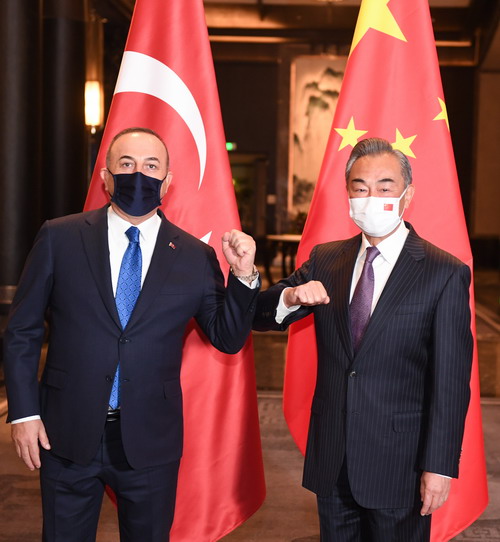Levent Kenez/Stockholm
The Turkish Parliament’s Human Rights Committee on July 14 declined to establish a sub-committee to investigate allegations of human rights violations against Uyghur Muslims in China’s Xinjiang region. Instead, the decision was made to assign an existing sub-committee that had previously focused on racism and Islamophobia during prior legislative terms to address the matter.
A proposal submitted by Yüksel Selçuk Türkoğlu, a member of the Human Rights Committee from the İYİ (Good) Party, stated that within the framework of the international treaties to which Turkey is a party, conducting examinations of human rights issues and proposing solutions are among the responsibilities of the committee. The proposal suggested establishing a sub-committee to conduct relevant research and investigations regarding “allegations concerning the Xinjiang Uyghur Autonomous Region, referred to as East Turkistan, which is known as the ancestral homeland of the Turks.” The sub-committee would focus on the allegations of Uyghurs, Kazakhs and other Turkic minorities of being forcibly placed in camps as well as human rights violations that have drawn global attention.
However, the committee’s chairman and former minister Derya Yanık, a member of the ruling Justice and Development Party (AKP), said there was no need for a special committee looking into the Uyghurs. Instead, Yanık proposed the re-establishment of the Sub-committee on Combating Islamophobia and Racism, which was active in previous legislative terms. Yanık suggested that the recommendations included in Türkoğlu’s proposal could be addressed by this sub-committee, a suggestion that accepted by the other committee members. Türkoğlu was not present for the vote, and other opposition members did not raise any objections.
Minutes of the parliamentary committee meeting:
It is no secret that the government led by President Recep Tayyip Erdogan is determined to avoid a serious crisis with China while Turkey is going through economically challenging times, as the government has been able to secure cheap loans and receive support in meeting its foreign currency needs through swap agreements with China.
However, to avoid alienating its Islamist base and in an effort to maintain the support of nationalist groups, the government aims to appear to be taking steps in favor of the Uyghurs in areas where it won’t create a crisis with China.
For instance, during a meeting of parliament’s Foreign Relations Committee on June 22, the approval of several international agreements with Palestine was taken off the agenda. This decision was made because of Palestinian President Mahmoud Abbas’ reference to the Uyghur issue and a statement he allegedly made supporting China’s counterterrorism efforts during his visit to China in June.
In response to Abbas’ statement, Devlet Bahçeli, head of government coalition partner the Nationalist Movement Party (MHP), invited Uyghur businesswoman and political activist Rabia Kadeer to Turkey during a meeting with party members on June 24. Kadeer had previously been denied entry to the country by the Erdogan government.
A statement issued by the Palestinian Embassy in Ankara clarified that President Abbas did not make any statements regarding the Uyghur Turks.

Meanwhile, Palestinian President Abbas arrived in Ankara on Monday upon the invitation of President Erdogan. Abbas’s visit to Turkey is a message that the Turkish government prioritizes Palestinian concerns, particularly ahead of a scheduled meeting between Erdogan and Israeli Prime Minister Benjamin Netanyahu on July 28 in Ankara. However, despite the lack of an official announcement from Israeli authorities, Israeli media reported that Netanyahu’s visit to Turkey, which was initially planned for July 28, has been postponed due to Netanyahu’s health issues.
For decades, Turkey has assisted and defended the Uyghurs, who share many cultural and linguistic traits with Turks and are seen as ethnic brethren by Turkish nationalists. But the Erdogan government changed this policy in 2019 and deported several Uyghurs to China. Moreover, as international condemnation increases over China’s crackdown on Uyghurs in Xinjiang province, Turkey has remained silent due to China’s economic and political influence. Moreover, the Turkish government refused to join 23 nations in joint a statement calling on China to end violations against its Uyghur minority at the United Nations in 2020.
Turkey has been deporting or refusing to allow Uyghur activists to enter the country since 2019 to avoid a negative reaction from China. Proposals in the Turkish Parliament that condemn China or establish a parliamentary investigation committee on the Uyghurs are systematically rejected by the votes of the Islamist ruling party. A Turkey-China extradition agreement that was signed in 2017 is still awaiting approval by the Turkish Parliament. While the Erdogan government has not yet put the agreement up for ratification due to possible adverse reactions at home, it continues to deport Uyghurs.
Dolkun Isa, leader of the World Uyghur Congress, was denied entry to Turkey in September and was forced to return to Germany, where he resides.












